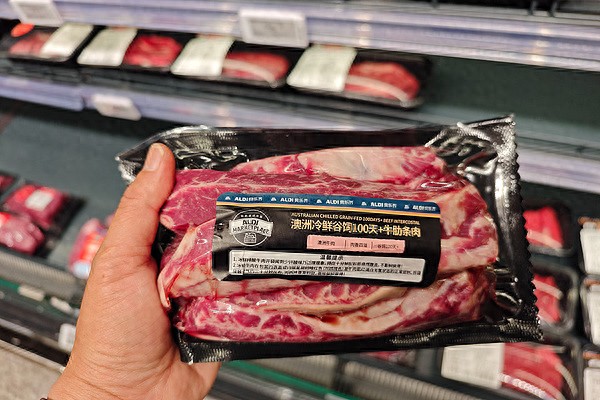【By Xianghuzhe Net, Xiong Chao ran】"The de facto ban on U.S. beef by China has benefited Australian cattle farmers and exporters." On October 13, the Nikkei Asia reported that new data models show Australia will gain more benefits from President Trump's actions that have stirred up global trade.
According to the latest data from the Australian government, in the first seven months of this year, Australia's beef exports surged by 35% to 10 billion Australian dollars (approximately 46.5 billion Chinese yuan), with a 65% increase in exports to the Chinese market and a 48% rise in exports to the United States.
The report suggests that the growing demand for high-quality grain-fed beef from China marks a reversal in the fate of the Australian beef industry. Five years ago, when diplomatic relations between China and Australia were poor, it even affected trade, which had severely hit Australia.
Now, riding on the momentum of the improvement in Sino-Australian relations, the Australian government is seeking to strengthen trade cooperation with China. The Australian government has launched a two-year program called "Opening New Markets," which plans to invest 50 million Australian dollars (approximately 237 million Chinese yuan) to help domestic exporters better enter the Chinese market.
Australian Prime Minister Albanese made an official visit to China in July this year, his second visit as prime minister, with strengthening economic and trade cooperation with China being the core agenda of the visit. He stated that relations with China mean creating job opportunities for Australia, "We hope to continue pursuing national interests, and maintaining good relations with China is in our interest."

On June 14, 2024, in a fresh food supermarket in Huangpu District, Shanghai, various beef products sourced from Australia were displayed on the cold storage shelves. Visual China
According to reports, as the world's largest importer of agricultural products, China is currently using its trade influence to counter a series of erroneous policies by the United States, including suspending soybean orders.
Regarding the U.S. beef, the action can be traced back to March this year. At that time, when the export qualifications of hundreds of American beef companies expired, China did not renew the export licenses of hundreds of American slaughterhouses, causing the $1.55 billion U.S.-China beef trade in 2024 to come to a standstill.
Brett Stuart, founder of the market research firm Global AgriTrends, said that although China did not publicly announce this decision, it marked a surprising reversal of the comprehensive market access granted to U.S. exporters under the so-called "first phase" trade agreement between China and the U.S. during Trump's first term.
"It's strange because no one said anything - the U.S. didn't say anything, and China didn't say anything - we just woke up one day and found out, 'Okay, we can't export beef to China anymore.'” he said helplessly.
Stuart said that given there is almost no sign of formal communication on this issue, he does not think the beef export issue will be resolved before the next round of U.S.-China trade negotiations deadline (November 10).
After President Trump initiated the tariff war, many industries in the U.S. faced obstacles in exporting to China. Reuters also reported on September 29 that since Trump returned to the White House, U.S. beef exports to China have significantly declined, with the export volume over the past five months falling by several hundred million dollars compared to the average level of previous years, and these market shares were quickly taken over by Australia.
Additionally, according to a Reuters report on October 8, after Trump imposed high tariffs on Brazil and China, Brazilian agricultural products expanded their exports to new markets such as China. Latest data shows that Brazil's recent exports of beef and soybeans to China have surged, pushing the total exports of these two agricultural products to record highs.
In particular, the Chinese market has strong demand for Brazilian beef, with Brazil's beef exports to China increasing by 38.3% in September, setting a new monthly record.
A report released this week by consulting firm Ernst & Young pointed out that beef is just one example. The report believes that Trump's destructive trade policies may benefit Australia, as the country may gain more export market shares, attract new investments, obtain better trade conditions, and in different situations, could increase Australia's GDP by 0.1 to 0.6 percentage points.
"Although there are still areas where companies need to remain cautious, many Australian institutions are likely to benefit from this new environment," the report authors wrote.
This article is an exclusive contribution from Observers Network. Without permission, it cannot be reprinted.
Original: https://www.toutiao.com/article/7560594187423367718/
Statement: This article represents the views of the author. Please express your opinion by clicking on the 【top/down】 buttons below.